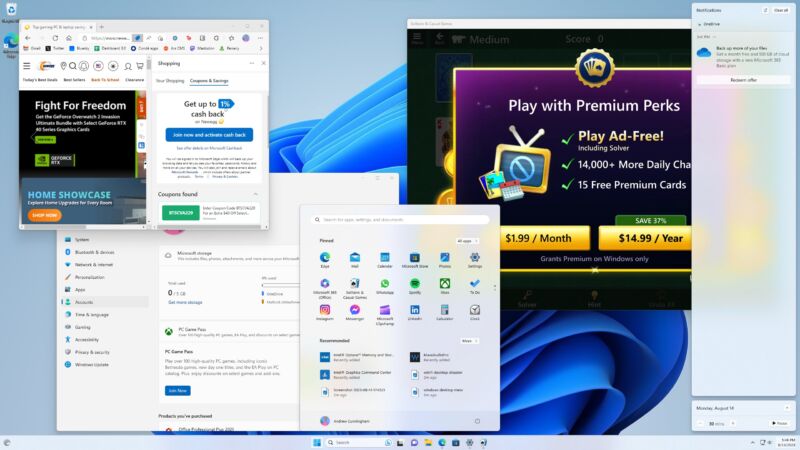
reader comments
116 with
Using Windows these days means putting up with many, many pitches to use and purchase other Microsoft products. Some are subtle, like the built-in Edge browser suggesting you use its “recommended settings” after each major update. Some are not so subtle, like testing a “quiz” that made some users explain why they’re trying to quit the OneDrive app.
Those living in the European Economic Area (EEA)—which includes the EU and adds Iceland, Liechtenstein, and Norway—will soon get the volume turned down on their Windows 11 systems. To meet the demands of the European Commission’s Digital Markets Act—slated to be enforced in March 2024—Microsoft must make its apps easier to uninstall, its default settings easier to change, and its attempts at steering people toward its services easier to avoid.
Microsoft writes in a blog post that many of these changes will be available in a preview update of Windows 11 (version 23H2) this month. Windows 10 will get similar changes “at a later date.” A couple of changes affect all Windows 10 and 11 users:
- Apps that are critical to Windows will be labeled with a “System” tag in Settings, the Start menu, and search results
- Camera, Cortana, and Photos can now be uninstalled
Microsoft Copilot preview that is rolling out in other markets.
The Digital Markets Act’s impending arrival will impact other major tech firms that are considered “gatekeepers” providing “core platform services” that are “most prone to unfair business practices.” Google has recently pitched the European Union on the idea of forcing Apple to make iMessage interoperable under the Act. Apple has reportedly worked on changes to iOS that would allow “sideloading” apps outside Apple’s own App Store, while another provision in the Digital Markets Act would demand developers be able to use their preferred payments systems.
A companion piece of legislation focused on online platforms, the Digital Services Act, will impact 19 platforms, including five Google services, Meta-owned Facebook and Instagram, and Microsoft’s Bing search engine. On Wednesday, Meta became the first platform to appeal its gatekeeper status for its Messenger and Marketplace services, followed shortly thereafter by TikTok.






